
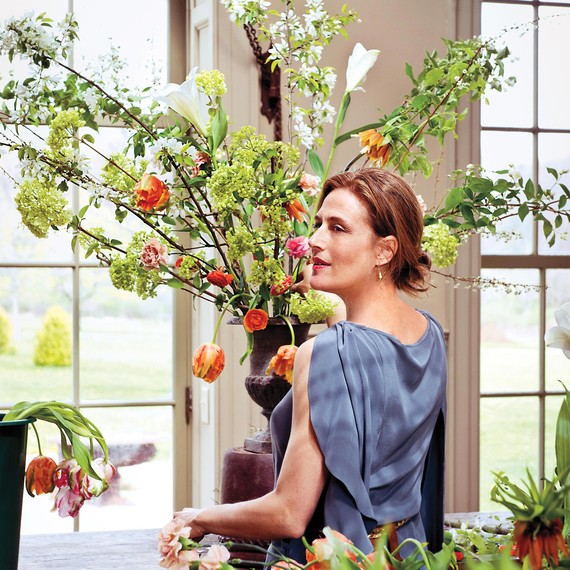
Photography by: Gabriela Herman
When Ariella Chezar describes her work, the Massachusetts-based floral designer likes to use words of a gustatory nature. The grassy components of her pink bouquet are “yummy,” for instance, and the sorbet palette of the tall arrangement by the window struck her as “juicy.”
Arguably, she’s justified. Over the past 20 years, Chezar has designed arrangements so alluring that they affect onlookers in a visceral way. Her creations invite you to come closer — to touch, gaze, and drink them in. Professionals and amateur enthusiasts from around the country flock to her flower-arranging workshops (like the one we visited at the Jardin de Buis, an event space in Pottersville, New Jersey), hoping to understand her sixth sense for making bouquets that are alive and loose, as if — as one student noted — they’re tumbling right out of the vase.
“I’m inspired by how things grow,” says Chezar, whose second book, “The Flower Workshop” (Ten Speed Press), comes out this month. She knew flowers were her calling when she walked into a family friend’s home flower-arrangement studio and was instantly swept up by the scent of tuberose and the sea of colors before her. “It was a classic ‘aha!’ moment,” she says.
Today, Chezar’s astute choices in color allow each arrangement to look thoughtfully composed yet at the same time exhilaratingly wild. “By the time I go out to gather flowers, I’ve already decided on the color I want for my bouquet, and I build from there,” she says. The designer has the luxury of picking from a 90-acre sustainably grown flower farm that she co-owns with her husband in Ghent, New York.
Workshops occasionally begin outside, so students can take in the color from all around them. This not only emphasizes the importance of local and in-season materials, but also encourages students to look beyond the flower shop for arrangement ideas—be they an unusual mingling of flowers and vines, or branches that swoop up in the air. “In a sense, we’re simply putting flowers in a vase—what’s the big deal?” she says. “But it’s also an opportunity for students to delve into what they don’t normally explore. Sometimes they even cry, but for many people, it’s a rare chance to be creative and play with color.”
And while Chezar has created countless bouquets for elaborate weddings and magazine shoots, she has a special fondness for showing others how to arrange flowers for themselves. “The process is beautiful and at times even emotional,” she says. “For a teacher, that’s very rewarding.”
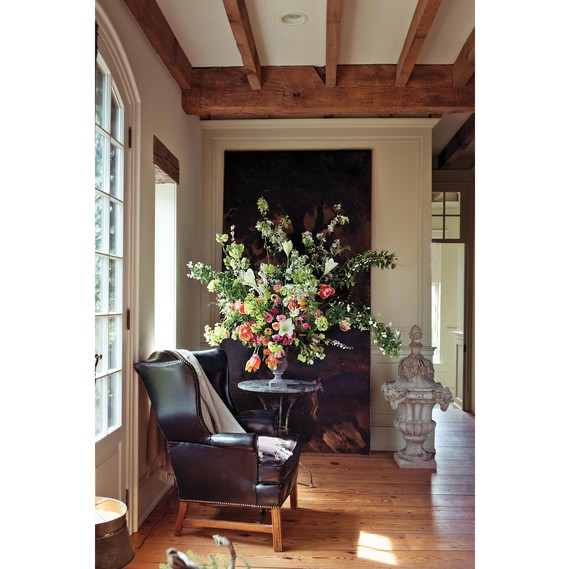
Photography by: Gabriela Herman
Lesson 1: Play With Contrasting Colors
Pretty pinks and salmons — along with bright greens from the opposite half of the color wheel — create a vibrancy that lights up a room. “It’s springy and refreshing,” says Chezar. Each bloom offers a different shape, encouraging eyes to wander from place to place. The angularity of green-white lilies “breaks up the arrangement of round faces” of the rosy-hued ranunculus and parrot tulips. Viburnums provide the backdrop: With their up-swooping branches and small, glimmering white blooms, the effect is practically electric.
Get More Tips for Creating Professional-Looking Centerpieces
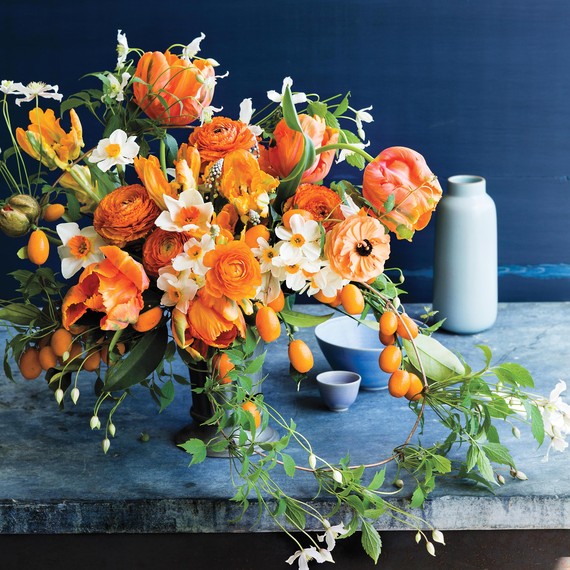
Photography by: Erin Kunkel
Lesson 2: Be Fruitful
Flowers aren’t the only way to create a bouquet with stunning colors: Consider produce. “I especially love combining flowers with fruits on the vine,” says Chezar. This fiery play on the color orange uses kumquats to adorn similarly hued parrot tulips, ranunculus, and poppies. As a final touch, Clematis montana is allowed to cascade out of the vase with “no rhyme or reason,” says Chezar — its white blooms are only visually reined in by the white daffodil petals. The effect, says Chezar, is “a little wild, a little whimsical.”
Learn How to Make This Rose Hip Arrangement
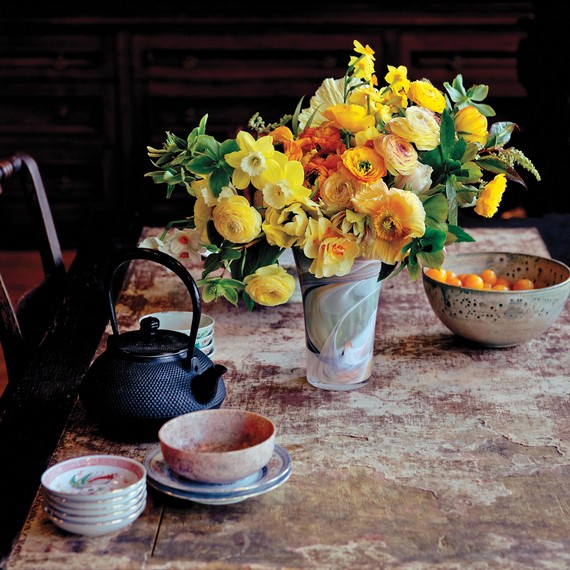
Photography by: Gabriela Herman
Lesson 3: Riff on a Color
Chezar goes “deep into yellow” with this bouquet of daffodils, Icelandic poppies, and ranunculus. Blooms ranging from white-yellow to yellow-orange are densely clustered front and center, then framed by green hellebores. “They contain the yellow,” she says, “like a cuff.”
Alabaster small glass vase, in Aquamarine, vietri.com.
Get Kevin Sharkey’s Flower-Arranging Tips
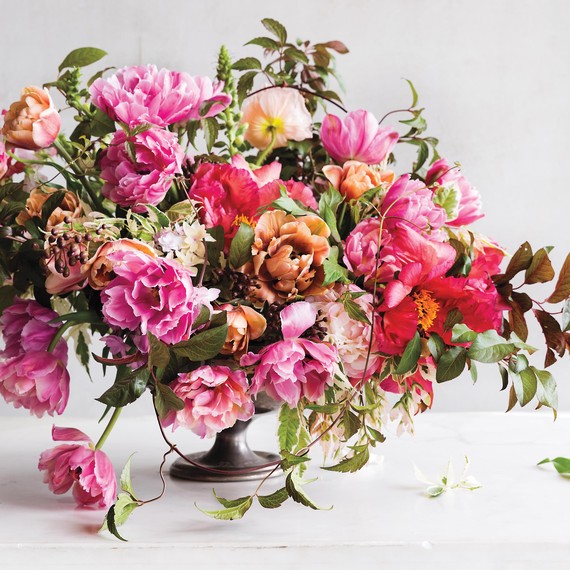
Photography by: Erin Kunkel
Lesson 4: Take a Fresh Look at Leaves
A favorite workshop project of Chezar’s is building entire bouquets from leaves, vines, and branches, so students learn that leaves aren’t simply green — they’re numerous shades of green as well as plum, brown, and more, and as valuable to the composition as the blooms are. Case in point: the bouquet of ruffly ‘La Belle Epoch’ tulips, anchored here with putty and a flower frog. The flower’s rosier tones are enhanced by the fuchsia tree peonies and white ‘Shooting Star’ hydrangeas, as well as the rosy ribbing of the plum-tree foliage. Its beige and peach tones are reinforced by eucalyptus berries and the wending Clematis montana.
Aged Venetian fruit bowl, 11″, campodefiori.com.
Learn How to Frame Pressed LEaves
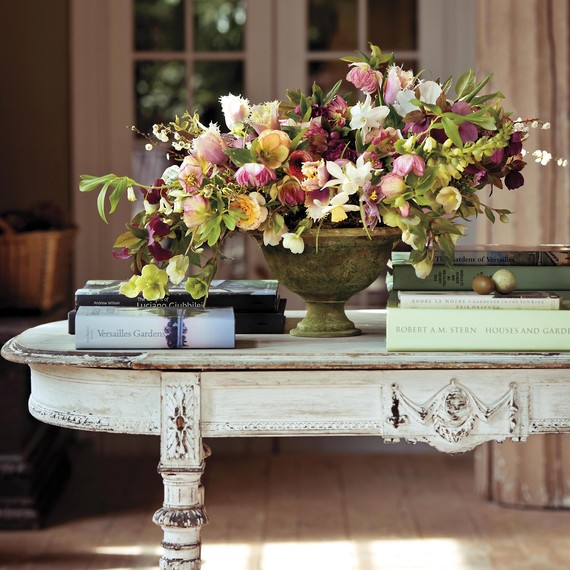
Photography by: Gabriela Herman
Lesson 5: Tune Into Tones
Upon arriving at the workshop last spring, Chezar couldn’t help but notice the hellebores. “They were growing all over — and they started everything,” she says, referring to how she conceived of this bouquet. They appear mauve here, but look closely and you’ll notice other colors in the flowers, too — green and white, for certain, but also pink, beige, and plum. “I love these dusty in-between tones,” says Chezar, who then slipped in other flowers that both echoed the hellebores and added textural nuance, including fringed lavender parrot tulips and Solomon’s seal, with its tiny white bells.
Find more floral-design techniques.
Bright orange and pink arrangements excerpted from The Flower Workshop: Lessons in Arranging Blooms, Branches, Fruits, and Foraged Materials, by Ariella Chezar and Julia Michaels, photography by Erin Kunkel. Photography © 2016 by Erin Kunkel. Published by Ten Speed Press, an imprint of the Crown Publishing Group, a division of Penguin Random House LLC.
SOURCE:http://www.marthastewart.com/1144433/things-to-know-creating-flower-arrangements